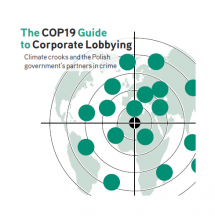COP19 Guide to Corporate Lobbying The Polish government’s partners in crime
Regiones
At a time when genuine progress towards real climate action is more vital than ever, this guide exposes how the corporations most responsible for climate change have taken over this year’s UN climate talks.

This year marks the 19th session of the UNFCCC’s Conference of the Parties (COP19), and the climate talks are taking place in the Polish capital of Warsaw, 11-22 November 2013.
Poland’s government is renowned for its pro-coal, anti-climate stance. It is now infamous, together with other EU member states, for its blocking of more ambitious EU climate and energy policy, including increasing energy efficiency, renewables and emission reductions targets, and for pushing for the exploitation of shale gas and so called “clean coal.”
COP19 is taking place against a backdrop of huge numbers of corporate side events, many given an extra boost of importance by official links with the Polish COP’s organisers. The Pre-COP, a crucially important moment of the negotiations, included an unprecedented “business day”.
COP19 is also the first UN climate talks to have corporate sponsorship, with some of the biggest climate crooks as official ‘partners’, including ArcelorMittal, Alstom and BMW. The Polish Ministry of Economy has even teamed up with the World Coal Association to put on a parallel “International Coal and Climate Summit”, whose joint “Warsaw Communiqué” is simply a blunt call for more coal and CCS, wrapped in the language of sustainable development. Added to that, notorious big business – and anti-climate lobbies have lined up to attend the Warsaw COP.
All in all, this year’s UN climate talks are set to be the most corporate captured yet, at a time when genuine progress towards real climate action is more vital than ever. COP19 is a critical point on the road to Paris 2015, when a new, binding global climate deal must be reached, but it is at COP19 that countries need to commit to having concrete emissions reduction targets ready by next year’s COP in Peru, as well as lay the foundations for the new deal in 2015.
Big business, industry and finance, keen to set the agenda and shape the rules in the interests of their profits – and at the expense of climate justice – have infiltrated COP19.
This guide to the web of corporate lobbying and industry capture will expose the eleven official corporate partners of the conference, take a look at some of the other influential Polish lobbies, and examine an extensive (though non-exhaustive) list of the lobby groups attending the COP, according to the sector they represent. These sectors include fossil fuels, cross-sectoral big business groups, carbon market and financial players, agribusiness and agrofuels, as well as some of the big polluting industries.
Throughout the lobby guide you’ll also find boxes on the false solutions that are being offered up by these corporate lobbies, such as shale gas (extracted through hydraulic fracturing), carbon capture and storage (CCS) and carbon markets. Big business is attempting to disguise its so-called ‘solutions’ as green, when in fact they serve their narrow economic interests whilst jeopardising real, effective and fair climate action.
The real alternatives are clear: we need to keep fossil fuels in the ground, ensure a just transition towards a post-fossil fuel society, based on community-owned decentralised renewable energy, social justice, equity and an end to the exploitation of resources and people.